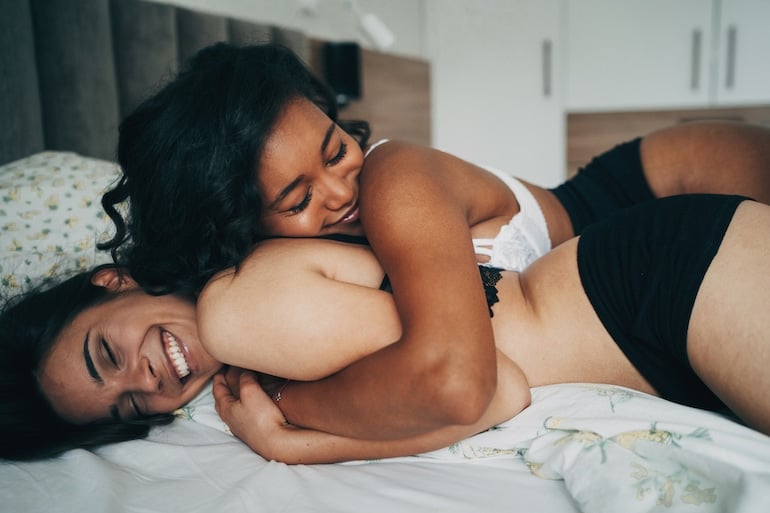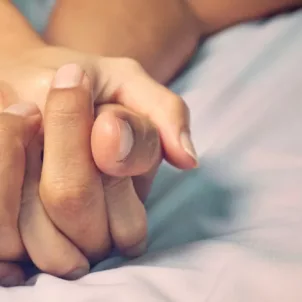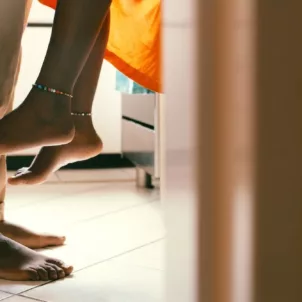An OB-GYN and sex therapist discuss possible causes of low libido in women and strategies to help you feel better about and recharge your sex drive.
There are times, even when the setting seems to be just right, that your body might not feel it’s the right moment for any kind of sex. If this tends to happen to you more often than not, you’re far from alone. Low libido in women is extremely common: The University of Chicago Medicine estimated in 2019 that around one-third of women report having low or decreased libido. Of course, the difficult year (and then some) that was 2020 didn’t help with libido: A small study in Italy found that 24 percent of women felt their level of sexual desire was lower in 2020 as compared to normal.
Having a decreased desire for sex, either compared to what you might normally experience or compared to what you *think* you should have, may make you feel like there’s something wrong with you, but that is not the case at all. There are many causes of low libido that have to do with aspects of your health and are completely out of your control and there is no single “right” sex drive. Read more about the most common causes of low libido in women and how you can care for yourself when you’re feeling less than in the mood.
What is low libido?
Sexual desire and sexual arousal often get clumped together under the terms sex drive or libido, but there are actually key differences. Libido is the desire to be sexual, whereas arousal is how your body responds to sex. There’s no “ideal amount” of desire, particularly in a time of stress, clinical psychologist Lauren Walker, PhD points out in a 2020 journal article published in Nature.
Sex drive exists on a spectrum. “It naturally fluctuates in both men and women over the years, and it’s normal for one’s interest to not match one’s partner’s interest at times,” explains Lauren Dummit, LMFT and certified sex addiction therapist in private practice in Los Angeles.
A change in what feels like your natural level of libido can happen for many different reasons. Major life changes or hormonal changes including pregnancy, menopause, illnesses, job loss, or the end of a relationship could contribute to a dip in your sex drive. “Additional factors, such as location, the situation, body image, or self-esteem can be more likely to influence women’s sexual desire,” says Dummit.
“It is not necessarily a health concern to have low libido; however, if this is not your personal norm, it may be a good idea to talk to your doctor about the changes you are experiencing,” says Jasmine Pedroso, MD, an OB-GYN at Kindbody in San Francisco. “Your doctor can help tease out whether it might be more of a medical issue or a psychosocial or relationship issue,” she adds. If you’re persistently experiencing low sexual desire, regardless of the partner or situation, and it’s affecting you negatively emotionally, that could be a sign of Hypoactive Sexual Desire Disorder, according to the American Sexual Health Association. It likely occurs in about 10 percent of women, but there are treatment options you can discuss with your OB-GYN. Whether you think you might have symptoms of HSDD, including almost total absence of sexual thoughts and potential distress in a romantic relationship as a result, or you notice that you have lower sexual desire sometimes, it’s important to know more about some of the causes of low libido and possible remedies.

What causes low libido in women?
1. Stress and Mental Health Concerns
“Stress, whether related to external factors or mental health issues, can play a significant role when low libido is an issue,” Dummit says. “It may not be due to lack of interest or desire, but sometimes one just cannot find the energy or motivation in today’s busy world with so many conflicting demands.” Decreased sex drive can be a sign of a more serious mental health condition too, including anxiety, and more commonly, depression. Since depression involves low levels of certain feel-good neurotransmitters in the brain, like dopamine and serotonin, it can also affect your sense of pleasure, sexual desire, and self-esteem, according to the Cleveland Clinic.
HOW TO CARE FOR YOURSELF
If it seems like your lack of desire is more sporadic and related to regular life stressors, it might help to engage in relaxing activities to unwind before sex, such as a hot bath or shower, a guided meditation, or even exercise to release tension, Dummit suggests. Trying something like listening to erotica (you can download apps like Dipsea and &Jane) may help you get in the mood too.
On the other hand, if you feel your mental health is affecting your sex life, it’s more important to talk about it, with a partner, with a therapist or sex therapist, and with your doctor, before trying any other remedies on your own, Dr. Pedroso advises.
2. Perimenopause and Menopause
One of the most common causes of low libido is the hormonal changes that happen during perimenopause and post-menopause. Natural perimenopause typically begins in your 40s, but can start earlier for some women. Whether you begin menopause naturally, surgically, or as a result of chemotherapy treatment, low libido can be a symptom. A survey by Oregon Health and Science University found that 41 percent of menopausal women infrequently experienced sexual desire. The culprit may be the dropoff in estrogen levels during menopause, which can cause decreased desire and vaginal dryness, often making sex painful.
HOW TO CARE FOR YOURSELF
Estrogen therapy (also called hormonal replacement therapy) is one prescription treatment that could be helpful to improve symptoms of menopause, including low libido, vaginal dryness, night sweats, and even low mood, Dummit says. You can speak to your doctor to see if it might be a fit for you. If you’re looking for natural remedies for low libido, Dummit also recommends getting back in touch with your sexuality by experimenting with alternate sex positions, especially if sex is painful, or testing out a vibrator. “Vibrators can improve vaginal lubrication, orgasm, and genital sensation,” she adds.

3. Birth Control and Other Medications
“Medications such as birth control, antidepressants, blood pressure, and anti-seizure medications can also affect libido,” says Dr. Pedroso. Some research has found that certain birth control pills with lower estrogen levels contribute to vaginal dryness and that people taking combined oral contraceptives (an estrogen-progesterone prescription like Loestrin or Ortho Tri-Cyclen) might experience low libido as compared to people who are not on hormonal birth control at all.
And while mental health concerns such as depression can add to low libido, antidepressants and other medications used to treat depression and anxiety could also lead to low libido in women. These medications chemically work to stabilize your mood, and this can affect the way you respond sexually. In one study, 71.8 percent of antidepressant users reported negative effects on their sex drive.
HOW TO CARE FOR YOURSELF
When it comes to potential medical causes of low libido like a new (or recurrent) side effect of medication, it’s best to bring this up to your doctor first, to see if there are any solutions or potential changes you can make to your medication dosage or prescription. If you have a partner, having an open discussion with them about what you’re feeling as a result of your medication can be beneficial. A doctor might recommend a change in medication, in some cases, or counseling, if low libido seems to be related to your relationships or a pervasive relationship issue.
4. Pregnancy or Postpartum
Similar to the impact that menopause can have, hormonal changes in your body during pregnancy and after birth as well as changes in your mental health during those periods may lead to a low sex drive, and that’s completely normal, says Dr. Pedroso. While in some women, the surges of estrogen and progesterone during pregnancy can lead to a greater desire for sex, in other women, symptoms associated with pregnancy like fatigue, nausea, or even self-esteem associated with a changing body can cause a decrease in libido.
Postpartum, estrogen dips, and hormones can be erratic, so that alone can lead to decreased sex drive. Add in the fatigue of being a new mom, possible vaginal pain as your body returns to normal, the stress of having another human to take care of…you get the idea. Changes are normal.
HOW TO CARE FOR YOURSELF
Make time for date nights, says Dummit. She recommends taking turns planning, introducing spontaneity and creativity, as well as just having fun without expectations. The element of surprise can help get you in the mood. And remember that you don’t have to jump straight to sex—engage in other forms of intimacy like sensual massage, blindfolding and feeding one’s partner, giving one’s partner a bath, or other intimate connections.









